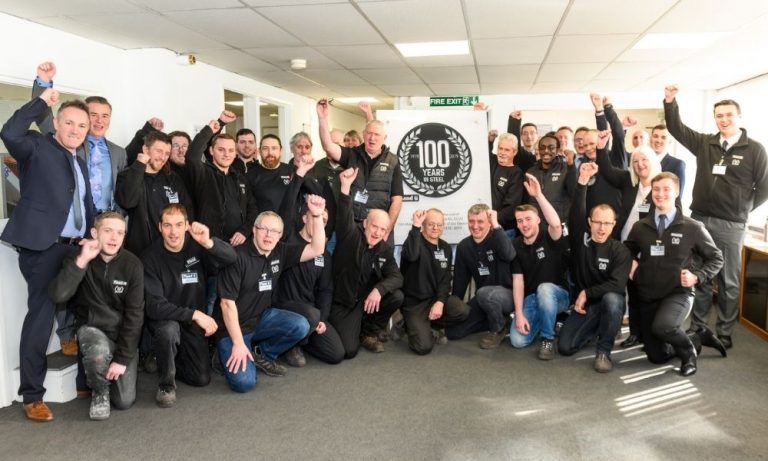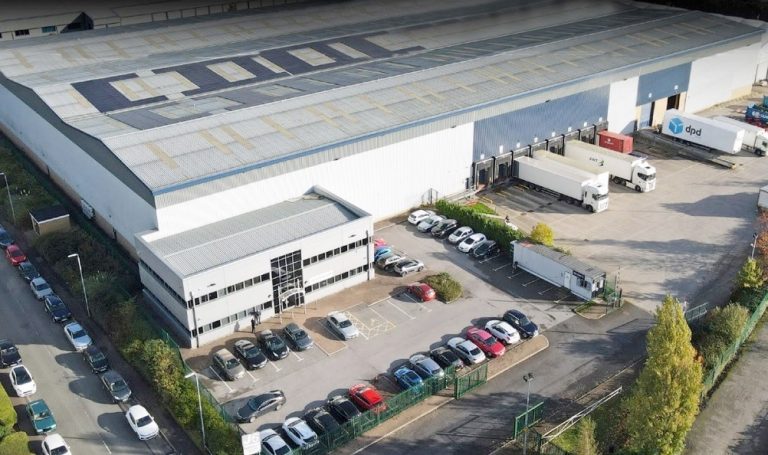Caddick Construction is appointed to build distribution warehouse at Trafford Park
Caddick Construction (North West) has won a £4.3m contract to build a 68,000 sq ft distribution warehouse at Trafford Park, Manchester.
The new Guinness Point warehouse is being delivered on behalf of Heref Merlin Trading Property Unit Trust, with work now underway on the Richmond Road scheme.
The distribution warehouse will be 14.5m high to the parapet and will include two floors of offices, together with a service yard, car parking and landscaped areas. The build contract also covers all drainage and external services.
Caddick Construction has a long history of involvement at Trafford Park and the surrounding area, having delivered The Williams Group’s £41m flagship automotive retail centre at TraffordCity and the international headquarters for Regatta on Mercury Way.
Trafford Park was the first purpose-built industrial park in the world and, with over 9 million sq.m of business space, remains one of the largest and most successful business parks in Europe. Trafford Park is home to more than 1,330 businesses employing over 35,000 people.
Ian Guildford, Contracts Manager at Caddick Construction (NW), said: “Trafford Park continues to go from strength to strength and its popularity as a logistical hotspot for the North West shows no sign of abating. We are delighted to be working at Trafford Park once again, delivering another high quality, industrial unit to help meet growing demand from the logistics sector.”
Architect for the build is Liverpool-based Brock Carmichael, with engineering support from Healey Consulting. Project Manager is Black Cat Building Consultancy Limited.
New senior appointment for Property Disputes at Blacks Solicitors
Blacks Solicitors has recently appointed a senior associate solicitor to the Commercial Dispute Resolution team.
Paul Sagar has joined the Firm to expand the specialist Property Disputes offering. The Property Disputes team acts on behalf of landlords, tenants and landowners, and offers advice to resolve disputes and avoid further issues later down the line. The team deals with the full range of property litigation matters, and has particular experience and expertise in dilapidations, development work and telecommunications, in which they are nationally renowned.
Commenting on his appointment, Paul said: “It’s a real privilege to have been appointed by Blacks in order to contribute to its significant growth plans, in particular for Property Disputes and Commercial Dispute Resolution. I’m really looking forward to working alongside Luke Maidens and Luke Patel to grow the team and provide a first class service to existing and new clients.”
Paul has over 15 years’ experience, acting in a wide variety of commercial and residential property disputes for landowners, occupiers, lenders, receivers and developers. Paul has previously worked at leading law firms in London and Leeds, most recently at a boutique property litigation practice. He also has specialist experience in the field of telecommunications, having represented both site providers and operators in the past.
Luke Maidens, head of Property Disputes, commented: “We have exciting growth plans for both Property Disputes and the Commercial Dispute Resolution team as a whole. Paul’s appointment has strengthened the teams and will enable us to continue expanding our offering as one of the strongest teams in the region.”
Paul’s appointment brings the total number of team members in the Commercial Dispute Resolution team to 19, with five in the Property Disputes team specifically.
Head of Commercial Dispute Resolution, Luke Patel is delighted that Paul has joined the team. “Paul’s wealth of property litigation experience and skill set will strengthen the team to deliver an exceptional service to our growing local and national property client portfolio. Paul is a perfect fit, and his recruitment is in line with our vision and future growth strategy. Working closely with Partner Luke Maidens, their joint expertise in telecommunications will now enable the team to confidently provide that offering to that specialised sector.”
Successful year for Leeds-based Pland Stainless
Leeds manufacturer, Pland Stainless, has reported a positive 10% growth in sales during 2021, despite the market challenges faced with the Covid-19 pandemic and Brexit uncertainty. The business, which has been manufacturing stainless steel products, mainly for the commercial market since 1919, has seen the largest growth on bespoke made-to-measure products from all sectors including healthcare, catering, secure accommodation, and education.
Pland had a busy year all round with lots of investment secured in the business too. They purchased and have been trialling two robots for welding and polishing, designed to be used for repetitive tasks, particularly where vibration causes health and safety concerns for their skilled polishers. They have had a new guillotine machine installed, a new heavy lifting machine for stainless steel sheets, additional space heaters for the building and new racking for storage.
The building, which has been occupied by Pland for over 100 years, also required some maintenance and during 2021 they re-covered parts of the roof and disposed of a 60-year-old press no longer in use. The press, which weighed in at 80 tonnes, had to be cut in half to be removed at a cost of over £16,000. All this as well as investing in more finished stock to secure supply and maintain lead times for customers.
“2021 was a busy year for everyone at Pland, but a successful one and it’s all credit to the team that we achieved so much in very challenging and uncertain times.” Said Steve Duree, MD of Pland Stainless, who has over 40 years of service with the business.
“We have to plan our steel supply a year in advance and submit our intended usage to our supplier. Forecasting is never an exact science, but it was particularly difficult in the current climate. Our stockholding has increased by around 25% to ensure continuity of supply and all at a time when overall steel prices were running around 18-25% higher than the prior year.”
Pland Stainless managed to finish the year without any price increases being passed to their customers, albeit in January 2022 they have had to succumb to a 6% product increase. In a business where there is so much fluctuation in raw material prices and a need to constantly invest in the latest, expensive machinery and technology, the experience of the team has a massive contribution to its success. Pland’s employee retention record is certainly above average with a number of employees achieving over 30 years of service with the business. It employs traditionally skilled craftsmen and continually recruits apprentices to learn and continue the trades. It’s this experience and knowledge, coming from years in the market, that has helped Pland make the right choices over the past two years, helping it to grow in unprecedented times.
A super deduction successor could trigger £40bn-a-year boost for UK business investment
Introducing a new permanent investment deduction to succeed the Government’s super deduction could boost UK business investment by up to £40bn a year by 2026, according to a new CBI survey.
Data compiled from 325 firms – of all sizes and sectors of the economy – suggests the super deduction has spurred investment and that a permanent incentive could trigger an annual 17% uplift in capital spending. This could turbo-charge growth ambitions, helping raise productivity and improve living standards across all UK nations and regions.
The CBI survey reveals more than half of respondents took advantage of the super deduction – or plan to do so – to increase or accelerate capital investment plans.
However, with the scheme set to end in 2023, there is a risk business investment could tail off at a crucial time, when the OBR is projecting post-recovery economic growth levelling out at a modest 1.3-1.7%. The recent Bank of England forecast is more pessimistic still, expecting growth of only 1.0% in 2024. In the CBI’s own economic forecast, business investment is expected to fall in spring 2023, once the super deduction ends.
The business group is urging Government to create a permanent 100% tax deduction for capital spending in the year of expenditure at this year’s Spring Statement, helping to sustain business investment throughout 2023 and ushering in a 17% rise in business investment over the medium-term.
If the super deduction expires without a successor, the CBI forecasts the UK will remain the lowest in the G7 for business investment by 2026. Implementing a permanent investment deduction would lift us off the bottom, fuelling higher growth and productivity across the UK. Longer term, increasing productivity is the only sustainable way to pay down debt and meet rising spending pressures.
Tony Danker, CBI Director-General, said: “The Chancellor’s super deduction exemplified the boldness in public policy that we need to inspire investment and get the economy moving. Going by our survey results, it looks to be a real success. It’s started the job but cannot be a one-hit wonder. Evolving the policy from short-term fix into long-term strategy will give firms confidence that Government and industry are aligned.
“The UK is facing the highest tax burden in decades. But by rewarding firms who put money into their operations, we can unleash new innovation and productivity – the ingredients we need to escape the low-growth trap and build a stronger, sustainable and more equitable economic future.”
Key survey results:
Impact of the Super Deduction:
- More than half of firms (53%) plan to claim the super deduction.
- A fifth of qualifying capital spend is only taking place because of the opportunity presented by the super deduction.
- Some 19% of qualifying capital spend was as a result of accelerated investment plans due to the super deduction.
- And 2% of qualifying capital spending is being invested in the UK – rather than elsewhere – because of the super deduction.
- In total, 41% of planned qualifying capital investment in 2021-23 is due to the super deduction – more than half of which would not otherwise have taken place in the UK.
- 50% of respondents indicated they would revise investment plans as a result.
- 24% said they would make additional capital investments in the UK.
- 13% would make additional investments – and bring forward investment timescales.
- A further 13% would accelerate UK investments already planned.
- Survey respondents revealed plans for £1.3billion of capital projects and said a new investment deduction of the type proposed would see £169million of that spending accelerated – and a further £224million of projects added.
- Extrapolating these findings to a medium-term projection of business investment shows this could increase spending by 17% by 2026, compared to existing projections.
- This is equivalent to additional investment worth £40billion per year by 2026.
- Expanding the assets that qualify for a permanent investment incentive – to include, for example, second-hand, leased and rented assets – and expanding the relief to unincorporated businesses could raise investment further, with potential for an additional boost of 4% over current projections, or another £10billion of investment per year by 2026.
APSS Celebrates 25 years of creating Amazing Workspaces
Experts in office design, fit out and refurbishment, APSS is celebrating 25 years of supporting businesses across the country to create inspirational and impressive workspaces.
Founded in 1997, Darren Crookes started out on his own with two fitters to install office partitions and storage solutions for local businesses in the Lincoln area.
Laurence Barrass, Managing Director for APSS said: “We now employ over 35 people and still work in partnership with our very first customer, Siemens. It’s incredible to think we have now completed over 10,000 different projects for our customers which span from Cornwall to Aberdeen.
“Since the start, we have always helped smaller businesses as they remember the quality of service they receive from us, they grow as a company, then they turn into some of our biggest customers over the years. The partnership and bond we have with them is fantastic. It’s where we want to be – recognised as the company you can trust.”
APSS has naturally evolved from a partitions and storage solution company to provide a full design and fit out service across a range of sectors. It has adapted to include its own in-house joinery department to speed up delivery time on projects and decrease overall costs for customers.
Recently, the company has seen a change at the helm as Laurence Barrass became the new Managing Director, taking over from Darren who took a step back from the day to day running of the company, but remains as Chairman.
“To reach 25 years in business is a huge milestone for any company,” Laurence said. “We have survived recessions and a pandemic which no one could have prepared for. There was a worrying time when offices nationally were closed to workers and this being key to our business. But thanks to the knowledgeable skill of our staff and the flexibility it allows for, as a company we were able to adapt to better support our customers who were going through exactly the same challenges we were facing.
“We helped businesses which sold online to adapt their warehouse to cope with the additional stock levels required. Many of our key customers, like Wren Kitchens, used the down time in the offices to create a better and safer working environment ready for the post pandemic return to the office.
“It’s been a bumpy ride, but an exciting one. We know many companies have had to shift to a more flexible, hybrid way of working thanks to the pandemic. It has been great to support so many in transforming their current office space to better suit that style of working.”
When the company was first founded, it was all about trying to get the message out. The location in the Yellow Pages was an important consideration. Everything was faxed and drawings were all done by hand. To build up the business founder Darren Crookes knocked on every door he could find to obtain local clients. Many of which we are still working with.
However, after a while, customers started saying ‘you know you’re doing that, well can you get carpets, and can you get furniture?’ It was a natural progression from the partitions, racking and storage the company originally provided – and still does. It opened up the marketplace and APSS began to offer more of a service driven product.
“During the recession, APSS helped businesses to utilise their existing workspaces, similar to now after the pandemic. The only difference back then was it was about how we could squeeze as much in to the space as possible. Now it’s more about how to create a flexible working environment with space for people to move around the office without being crowded,” Explained Laurence.
APSS works with a wide range of companies across the UK including Wren Kitchens, Slimming World, Octopus Energy, Siemens, University of Lincoln and Bakkavor to name just a few.
“Over the years we have installed all sorts of different and quirky things from hidden bathrooms to Google inspired slides. As fun and different as these things are, our primary focus has always been ensuring our customers have a productive, efficient workspace that leaves a great impression.”
International property investor acquires Halifax distribution unit in £17m deal
A 126,534 sq ft logistics distribution unit in Elland, Yorkshire, that is let to Buy It Direct, one of the UK’s largest online consumer goods retailers, has been acquired in a £17 million deal.
Unit J6 at Lowfields Business Park was built in 2005 and sits in a 6.3 acre site, approximately one mile from junction 24 of the M62.
The site has been acquired by Cabot Properties, the international private equity real estate investment firm, which is exclusively focused on industrial properties. The acquisition was negotiated by the Investment team at Leeds property consultancy, Gent Visick (GV).
Michael Williams, director of investments at Cabot Properties, said: “This is a modern, well specified logistics asset, let to a fast growing, nationally recognised e-commerce occupier in a highly accessible location which makes this a strong addition to our core portfolio.
“We continue to actively seek both Core and Value Add opportunities to build upon our existing portfolios in the UK.”
Garry Howes, director of investment at GV, who negotiated the deal on behalf of Cabot, said: “In the current highly competitive industrial and logistics market with unprecedented levels of capital looking to be deployed, it is always a pleasure to be able to secure opportunities for our clients. This is a high-quality unit, close to the M62, that is let to one of the UK’s fastest growing online retailers.
“This made it a very compelling investment opportunity for Cabot Properties, and we’re very pleased to complete this acquisition on their behalf.”
Sheffield to be home to pioneering Gene Therapy Innovation & Manufacturing Centre
Sheffield has been chosen as the location for one of only three Gene Therapy Innovation & Manufacturing Centres to be established in the UK.
The pioneering Gene Therapy Innovation & Manufacturing Centre (GTIMC) has received £1.5m grant funding from the South Yorkshire Renewal Fund, towards its state-of-the-art facilities being built at a total cost of £14.2m. The GTIMC is expected to create 35 high value jobs.
The University of Sheffield’s Gene Therapy Innovation & Manufacturing Centre (GTIMC) is set to advance scientific discoveries into treatment options for millions of patients with life-threatening diseases that have no known medical cure.
Dan Jarvis, Mayor of South Yorkshire, said: “This is fantastic news for South Yorkshire and the North of England. It puts Sheffield right at the heart of world class research and innovation into Gene Therapy that will present a real opportunity for regional economic growth within the supply chain and job creation in South Yorkshire.”
Dan Jarvis continues: “The fact that South Yorkshire was chosen is significant – building on this region’s expertise in health and well-being research, utilising the valuable resources and expertise of the University of Sheffield. We expect this to be a catalyst for further enhancing health and well being research and development in South Yorkshire.”
The Gene Therapy Innovation & Manufacturing Centre will aim to develop four clinical therapies to be used in clinical trials and which will be taken forward into standard clinical care within the NHS. It is also expected to contribute an additional £28m of GVA to the region by 2027.
Professor Koen Lamberts, President and Vice-Chancellor of the University of Sheffield, said: “At the University of Sheffield we focus our research on finding real-world solutions to some of the biggest global challenges. The Gene Therapy Innovation and Manufacturing Centre will unlock development pathways for new treatments for people affected by devastating genetic disorders, many of which have no cure.
“We are delighted that our University is at the forefront of research in this pioneering field of medicine and that this new centre will build on our reputation as an international centre of excellence for gene therapeutics.”
Alongside receiving funding from South Yorkshire Regeneration Fund, the Gene Therapy Innovation & Manufacturing Centre is also receiving LifeArc funding of £6.4m, £3.1m from the University of Sheffield and a £3 million donation from The Law Family Charitable Foundation, established by Andrew Law and his wife Zoë.
The GTIMC is planned for a site on the University of Sheffield’s Innovation District close to existing translational research facilities and will contribute to an ongoing programme of regional investment and regeneration.
The centre will include a cutting-edge GMP (good manufacturing practice) facility that will support gene therapy projects emerging from universities across the UK.
The three national hubs, located at the University of Sheffield, Kings College London, and NHS Blood and Transplant in Bristol will operate as a coordinated network, sharing technical skills and resources to enable innovative gene therapy research.
Software company lets Leeds offices for corporate headquarters
The Leeds office of property consultancy Knight Frank has brokered a significant letting at The Bourse, a prestigious office and retail complex in Leeds city centre.
Merchandising software solutions company Retail Express has taken 4,290 sq ft on the 1st floor of Bond House, one of the three self-contained buildings which comprise the 50,000 sq ft Bourse.
The Bourse is a landmark building on Boar Lane less than 100 yards from Leeds Station and features 50,000 sq ft of high quality space over three buildings, overlooking a central courtyard.
Each of the buildings, Equity House, Sterling House and Bond House, has its own designated entrance with an NCP multi-storey car park to the rear. The Bourse has undergone a comprehensive multi-million pound refurbishment to provide Grade A offices of the highest standards.
Victoria Harris, senior surveyor with Knight Frank in Leeds, who advised landlords Paloma Capital, said: “We are delighted that a company of the calibre and reputation of Retail Express has taken space at The Bourse. This letting, together with other recent high-profile deals in Leeds city centre, underlines the current strength of the Leeds office market.”
Barry Grange, CEO of Retail Express, said: “We are excited to have chosen Leeds and The Bourse as our corporate headquarters to help us deliver the next chapter of our growth story. With a central location for our staff and excellent regional and national links, The Bourse stood out against the competition. The prestigious location offers first-class facilities within the thriving tech hub of Leeds.”
British Chambers research finds little love for EU trade deal amongst businesses
New research carried out by the British Chambers of Commerce of more than 1,000 businesses has highlighted a host of issues with the UK’s trade deal with Europe. The BCC believes urgent steps should be taken to address these problems so the UK Government’s ambition to increase the number of firms exporting can be met.
Overall, just 8% of firms agreed that the Trade and Co-operation Agreement (TCA) was enabling their business to grow or increase sales, while 54% disagreed. For UK exporters 12% agreed that the TCA was helping them while 71% disagreed.
When asked to comment on the specific advantage (for those that agreed) or disadvantage (for those that disagreed) of the trade deal, 59 firms identified an advantage, while 320 cited a disadvantage.
Of the 59 comments received on the advantage of the TCA, firms said:
- It had allowed some companies to continue to trade without significant change
- It had encouraged firms to look at other global markets
- It had provided stability to allow firms to plan.
- It had led to rising costs for companies and their clients
- Smaller businesses did not have the time and money to deal with the bureaucracy it had introduced
- It had put off EU customers from considering UK goods and services – due to the perceived costs and complexities.
Wakefield housing development paused
Wakefield Council has confirmed that a proposed development on Council owned land, at the site of the former Parkhill Colliery at City Fields, will be paused.
The Council has also given assurance that the part of community woodland on the land owned by the Council, which was previously earmarked for future education development, will no longer be developed and will be preserved for future generations. An alternative site for the education development will be sought when this becomes necessary.
The pause will then enable Bridge Homes, the developer for a planned housing scheme on the adjoining land, to review their proposals and consider possible additional environmental mitigations.
The Deputy Leader of Wakefield Council, Cllr Jack Hemingway, said: “We are listening to the voices of the local community and environmental groups, who have expressed concern about the loss of this much-loved area of woodland. Today the Council is committing to protect that area of the Parkhill woodland which was to become an education centre.
“The plans will change and we will work to find a different site for the education development in the future, in order to protect this green space that means so much to the community.
“We are also pleased that Bridge Homes are working with the Council’s Planning Team to further consider the impact on the adjoining site’s bio-diversity and natural environment.
“It is an incredibly difficult balance to strike between meeting the targets and planning requirements dictated by central Government, the housing and welfare needs of our communities, alongside our local aspiration to protect the environment. Please be assured that we will do all we can to achieve this.”
The Bridge Homes development, which will provide 116 homes for sale, rent and Shared Ownership was considered acceptable in planning terms and was recommended for approval to committee in December 2021.
Tony Watling, Managing Director of Bridge Homes, said: “We recognise the importance of minimising our environmental impact where we can. Whilst the proposed scheme met the planning requirements for this site, we will review our proposals to see if we can identify anything we can do differently to support the local biodiversity even more and further reduce the environmental impact.”
The Bridge Homes proposal already includes in excess of 145 new trees to be planted, as well as 510 square metres of native trees along with further plants, hedges and shrubs.
Critical work to install a foul sewer to support the wider City Fields site will continue. The construction of the sewer is a statutory undertaking and as part of this independent specialists have identified the necessary actions to mitigate and compensate the environmental impacts and effects on biodiversity.
Jane Brown, Interim Service Director for Economic Growth and Skills, said: “The ambition of the City Fields Masterplan has always been around improving the quality of life for local people. This comes in all shapes and sizes from investment, job creation and new homes, to lovely new play areas, parks and new businesses. These are opportunities that are much needed in this area.
“To help us achieve this, essential infrastructure needs to be installed and the new sewer is a crucial part of that. Work on this will continue and will also deliver a significant replanting scheme to replace hedgerows and shrubbery, along with planting 2,000 new trees across the City Fields site.”












